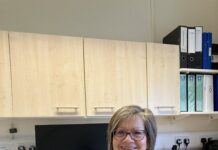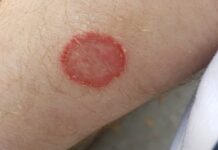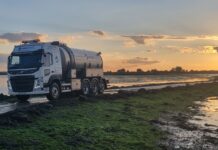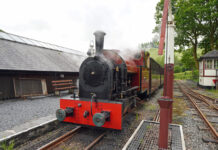Mae arweinwyr iechyd yn Ne-orllewin Cymru yn dadorchuddio’r cynllun gwasanaethau canser pwrpasol cyntaf ar gyfer pobl ledled y rhanbarth cyfan.
Mae Byrddau Iechyd Prifysgol Abertawe Bro Morgannwg a Hywel Dda wedi dylunio ffordd integredig a strategol ymlaen ar gyfer gwasanaethau canser anlawfeddygol i’r filiwn o bobl yn y rhanbarth dros y degawd nesaf.
Mae’n cwmpasu pob agwedd ar wasanaethau canser – ar wahân i lawdriniaeth – o ddarparu triniaethau oncoleg, cemotherapi a radiotherapi i gymorth emosiynol a gofal ôl-ganser.
Bwriad y strategaeth gydgysylltiedig newydd yw gwella mynediad i ofal a fydd yn lleihau amseroedd aros, lleihau teithio diangen trwy ddarparu llawer mwy o ofal canser mewn cymunedau lleol, gwneud y defnydd gorau o’r dechnoleg ddiweddaraf, cynnig mwy o gyfle i gleifion gael y cyffuriau a’r triniaethau diweddaraf, a gwella profiad cyffredinol cleifion. Bydd hefyd yn tyfu, yn cefnogi ac yn hyfforddi gweithlu canser clinigol y dyfodol.
Y datblygiad yw un o’r prosiectau trawsnewid gwasanaethau mawr cyntaf i ddeillio o ARCH (Cydweithrediad Rhanbarthol ar gyfer Iechyd), sef partneriaeth unigryw rhwng y tri sefydliad.
Bydd y Strategaeth Canser Anlawfeddygol newydd ar gyfer De-orllewin Cymru yn cael ei chyflwyno cyn hir mewn cyfarfodydd bwrdd yn y ddau Fwrdd Iechyd Prifysgol. Mae’n benllanw cyfres o weithdai a oedd yn cynnwys nid yn unig clinigwyr a rheolwyr y GIG, ond cleifion a sefydliadau gwirfoddol a chymunedol hefyd.
Dywedodd Philip Kloer, Cyfarwyddwr Meddygol Bwrdd Iechyd Prifysgol Hywel Dda:
“Gyda’n gilydd – trwy gydweithio yn y rhanbarth hwn – gallwn drawsnewid y gofal, y driniaeth a’r gwasanaethau a ddarparwn i wasanaethau canser yn Ne-orllewin Cymru.”
Dywedodd Dr Delia Pudney, Oncolegydd Clinigol Prifysgol Abertawe Bro Morgannwg:
“Rydym yn siarad yn aml am ganolfannau rhagoriaeth. Byddwn yn hoffi meddwl bod modd darparu rhagoriaeth yn lleol hefyd. Er bod y ganolfan yn cynnig arbenigedd dwys, ein rôl yw datblygu, cefnogi a chynnal rhagoriaeth leol.”
Dywedodd Cadeirydd Bwrdd Rhaglen ARCH, Andrew Davies: “Mae hyn yn enghraifft o waith partneriaeth go iawn a fydd o fudd gwirioneddol i gleifion canser. Mae hefyd yn dangos nad yw ARCH yn ymwneud yn unig ag adeiladau newydd neu ddatblygiadau mawr, ond yn hytrach gwneud y defnydd gorau o’n hadnoddau cyfun a meddwl mewn ffordd fwy cyfannol o lawer fel rhanbarth.
“Mae’n gosod y glasbrint ar gyfer yr agweddau anlawfeddygol ar wasanaethau canser yn Ne-orllewin Cymru dros y deng mlynedd nesaf. Wrth gwrs, ni fydd y cyfan yn digwydd dros nos, ond ni fydd yn hir cyn i gleifion a’u teuluoedd ddechrau gweld manteision y dull hwn o gydweithio.”
Dywedodd Cadeirydd Hywel Dda, Bernadine Rees: “Canser yw un o brif achosion marw cyn pryd yng Nghymru, ac mae nifer y bobl sy’n cael diagnosis yn cynyddu. Wrth i’n poblogaeth heneiddio, mae’r galw am ofal canser yn cynyddu.
“Mae llawer o gynnydd wedi’i wneud yn y blynyddoedd diwethaf o ran cyfraddau goroesi, ond mae’r strategaeth newydd yn cydnabod yr angen i wneud mwy byth.”
Yn Ne-orllewin Cymru, mae’r rhan fwyaf o’r gwasanaethau canser anlawfeddygol yn cael eu darparu ar hyn o bryd trwy fodel ‘prif ganolfan a lloerennau’, gyda Chanolfan Canser De-orllewin Cymru yn Ysbyty Singleton Abertawe yn brif ganolfan, wedi’i chefnogi gan nifer o ganolfannau triniaeth dan arweiniad nyrsys, sef y ‘lloerennau’ sydd wedi’u lleoli mewn ysbytai lleol ledled y rhanbarth.
Yn y dyfodol, bydd y brif ganolfan yn cael ei datblygu ymhellach – yn enwedig o ran triniaeth radiotherapi arbenigol – a bydd y ‘lloerennau’ yn chwarae rôl fwy o lawer. Ni fydd angen i gleifion mewn ardaloedd gwledig deithio mor bell mor aml ar gyfer oncoleg a thriniaethau canser eraill, oherwydd bydd mwy ar gael yn agosach i le y maent yn byw, ac weithiau yn eu cartrefi eu hunain.
Bydd gwasanaethau cymunedol yn cael eu rheoli i’r un safonau â chanolfan arbenigol o ran staffio, addysg a chymorth, a bydd mwy o ddefnydd yn cael ei wneud o unedau symudol, gan leihau’r angen i gleifion deithio.
Bydd clinigau a gwasanaethau eraill hefyd yn cael eu trefnu er mwyn ystyried materion cludiant, yn enwedig mewn ardaloedd lle nad oes llawer o gludiant cyhoeddus.
Bydd y defnydd o dechnoleg ddigidol yn cynyddu er mwyn galluogi gweithwyr gofal iechyd proffesiynol i roi cymorth i gleifion ddydd a nos saith niwrnod yr wythnos; yn ogystal â chynnal mwy o glinigau rhithwir.
Mae’r strategaeth yn galw am rôl fwy gweithredol i gleifion yn eu gofal, ac am adeiladu rhwydweithiau cymorth lleol.
Mae yna gynlluniau ar gyfer triniaeth radiotherapi arbenigol, a fydd yn cael ei darparu yn y ‘brif ganolfan’, ac a fydd ar gael saith niwrnod yr wythnos drwy gydol y flwyddyn. Mae’r rhaglen uchelgeisiol hefyd yn gobeithio datblygu gwasanaeth radioisotop therapiwtig i leihau’r angen i gleifion deithio y tu allan i’r rhanbarth ar gyfer y gofal arbenigol hwn. Mae hefyd yn anelu at ddarparu therapi pelydr proton rywbryd yn y dyfodol.
Bydd gan gleifion well gyfle yn y dyfodol i gael amrywiaeth o’r triniaethau mwyaf datblygedig. Mae Canolfan Canser De-orllewin Cymru eisoes wedi’i sefydlu fel arweinydd o ran treialon clinigol, ac mae Prifysgol Abertawe yn gartref i’r cyfleuster Ymchwil Glinigol ar y Cyd sy’n cynnwys gweithgareddau delweddu a threialon clinigol ar gyfer ymchwil ac arloesi.
Trwy ARCH, bydd gan gleifion canser well mynediad i ymchwil arloesol sy’n dod i’r amlwg. Mae cael poblogaeth o filiwn o bobl yn rhanbarth ARCH yn agor y drws i gleifion i fwy o dreialon clinigol ar gyfer y triniaethau diweddaraf.
Ei nod yw bod yn arweinydd ym maes addysg, ymchwil ac arloesi ledled ein gwasanaethau, gan ddarparu gofal sydd ar flaen y gad o ran technolegau newydd ac ymchwil.
Mae meddygaeth bersonol a’r defnydd o genomeg (disgyblaeth feddygol sy’n dod i’r amlwg sy’n cynnwys defnyddio gwybodaeth genomig am unigolyn fel rhan o’i ofal clinigol) hefyd yn cynnig cryn addewid o ran cynnig triniaeth i gleifion sy’n gwbl bwrpasol ar eu cyfer nhw.
Mae’r strategaeth hefyd yn cydnabod bod angen gwneud mwy i wella ansawdd bywyd pobl sydd wedi cael diagnosis o ganser, yn ogystal â chynnig mwy o gymorth i gleifion canser ar ôl i’w triniaeth glinigol ddod i ben. Bydd rolau newydd fel cydlynwyr gofal yn cael eu datblygu, a bydd mwy o gysylltiadau yn cael eu gwneud â sefydliadau yn y sector gwirfoddol.
———————————————————————————–
Health leaders in South West Wales are unveiling the first custom-made cancer services plan for people across the entire region.
ABM and Hywel Dda university health boards, with Swansea University, have designed an integrated and strategic way forward for non-surgical cancer services for the region’s million people over the next decade.
It covers all aspects of cancer services – apart from surgery – from the provision of oncology, chemotherapy and radiotherapy treatments to emotional support and post-cancer care.
The new joined-up strategy is designed to improve access to care which will cut waiting times; reduce unnecessary travel by providing much more cancer care in local communities; make best use of latest technology, and offer greater patient access to emerging new cancer drugs and treatments, and improve patients’ overall experience. It will also grow, support and train the future clinical cancer workforce.
The development is one of the first major service transformation projects resulting from ARCH (A Regional Collaboration for Health), a unique partnership of the three organisations.
The new Non-surgical Cancer Strategy for South West Wales will be presented shortly at board meetings of both university health boards. It is the culmination of a series of workshops involving not only NHS clinicians and managers, but patients and voluntary and community organisations.
Dr Philip Kloer, Hywel Dda University Health Board Medical Director said:
“Together – through the collaboration of one region – we can transform the care, treatment and services we provide to cancer services in South West Wales.”
Dr Delia Pudney, ABMU Clinical Oncologist, said:
“We talk a lot about centres of excellence. I would like to think excellence can also be delivered locally. While the centre may be an area of concentrated expertise, our role is to develop, support and sustain local excellence.”
ARCH Programme Board chairman Andrew Davies said: “This is a tangible example of true partnership working which will really benefit cancer patients. It also demonstrates that ARCH is not just about new building or major developments, but making the best use of our pooled resources and thinking in a much more holistic way as a region.
“It sets the blueprint for the non-surgery aspects of cancer services in South West Wales for the next ten years. Of course it won’t all happen overnight, but it won’t be long before patients and their families begin to see the benefits of this joint approach.”
Hywel Dda chairman Bernadine Rees said: “Cancer is one of the two biggest causes of premature death in Wales, and the number of diagnoses is rising. With our ageing population, the demand for cancer care is increasing.
“Much progress has been made in recent years over survival rates, but the need to do even more is recognised in the new strategy.”
In South West Wales the majority of the non-surgery cancer services are currently delivered through a ‘hub and spoke’ model, with the South West Wales Cancer Centre at Swansea’s Singleton Hospital as the hub, supported by a number of nurse-led treatment centres – the ‘spokes’ based at local hospitals across the region.
In future, while the hub with be developed further – particularly with specialist radiotherapy treatment – the ‘spokes’ will play a far greater role. Patients in rural areas will not need to travel so far so often for oncology and other cancer treatments, because more will be available closer to where they live, and sometimes in their own homes.
Community-based services will be managed to the same standards as a specialist centre in terms of staffing, education and support, and more use will be made of mobile units, reducing the need for patients to travel.
Clinics and other services will also be organised to take into account transport issues, particularly in areas where public transport is limited.
The use of digital technology will increase to enable healthcare professionals support patients 24/7; as well as holding more virtual clinics.
The strategy calls for patients to have a more active role in their care, and build local support networks.
There are plans for specialist radiotherapy treatment, delivered in the ‘hub’ centre, to become available seven days a week throughout the year. The ambitious programme also hopes to develop a therapeutic radioisotope service to reduce the need for patients to travel out of the region for this specialist care. It also aspires to provide proton beam therapy at some future stage.
Patients will have better access in future to a range of the most advanced treatment. The South West Wales Cancer Centre is already established as a clinical trials leader, and Swansea University houses the Joint Clinical Research facility which includes imaging and clinical trials activities for research and innovation.
Through ARCH, cancer patients will have greater access to emerging cutting edge research. Having a population of a million people within the ARCH region opens the door wider for patients to more clinical trials into the latest treatments.
It aims to be a leader in education, research and innovation across our services, delivering care which is at the leading edge of new technologies and research.
Personalised medicine and the use of genomics (an emerging medical discipline that involves using genomic information about an individual as part of their clinical care) also offers great promise in offering patients treatment which is bespoke to them.
The strategy also recognises that more needs to be done to improve the quality of life for people who have been diagnosed with cancer, and offer more support for cancer patients once their clinical treatment has ended. New roles such as care coordinators will be developed, and greater links made with voluntary sector organisations.
Help keep news FREE for our readers
Supporting your local community newspaper/online news outlet is crucial now more than ever. If you believe in independent journalism, then consider making a valuable contribution by making a one-time or monthly donation. We operate in rural areas where providing unbiased news can be challenging. Read More About Supporting The West Wales Chronicle






















